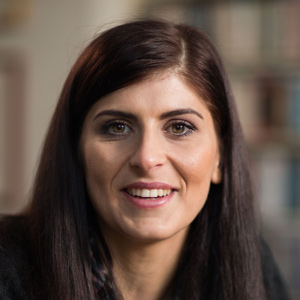Personal story – Stephanie

Stephanie’s beautiful eyes and easy smile speak of a carefree young woman making strong strides in the world. But, it wasn’t always this way.
What those same eyes mask is a past challenged by mental illness: she was diagnosed with bulimia at 18, had her first suicide attempt just shy of her 23rd birthday and was later diagnosed with borderline personality disorder (BPD).
“While the symptoms of borderline personality disorder can be quite diverse, for me it was an irrational and impulsive response to different situations. I was very black and white.
“One minute I could be totally fine then something would trigger me into a complete suicidal episode and a 24-hour downward spiral. BPD generally also is a co-morbid self-harm type illness. In my case it was an eating disorder – a sort of combination of anorexia and bulimia.”
She shares her experience with mental illness with others as an ambassador for SANE Australia’s Thriving Communities campaign, which aims to raise awareness of the benefits online support and social connection can have on Australians whose lives are affected by complex mental illness. Stephanie’s story of personal strength, grit and love is one of eight inspiring stories of Australians affected by mental illness, such as bipolar, schizophrenia, anorexia, major depression and suicide.
The term ‘borderline personality disorder’ was not something Stephanie had come across before her diagnosis but when it came, it provided a structure for from where to focus her treatment as opposed to the aimlessness she had felt beforehand. From here, she moved from Canberra to Brisbane and found a good psychiatrist who recommended she join a Dialectical Behaviour Therapy (DBT) group at her local hospital as an outpatient. The experience would prove to be one of the first forward- moving steps on her journey.
Together with her treatment, Stephanie acknowledges the significant role her family and friends have had on her management of the mental illness. She says her patient parents, her close friends and her partner, who “knows me better than I know myself”, have all meant the difference in her journey.
“My parents will both always say that I am, and always have been, a very determined person, and I will always get the most out of everything I put my heart into. So this mentality followed through into my recovery. If I was going to do it, I had to do it right and wholeheartedly if it was going to work for me.”
It is this spirit and commitment to herself, which has helped Stephanie navigate the choppy waters she has experienced, especially around the stigma of mental illness in her work and personal spheres.
While her current workplace is supportive, previous companies she has worked for have not been as caring. “I understand that having unproductive staff isn’t great for business… but I can also value an environment in which management support staff through their illnesses and hardships.
“There was more than one occasion where I would be teetering on the edge of suicide the evening before work, having an almighty episode, and I would have to wake up and perform at work the next day all the while dissociating so much that I couldn’t even engage in the simplest activity. How the hell do you explain that to your employer?”
There are many workplaces showing increasing support and assistance for employees who are diagnosed with mental illness, however, there are many others that continue to feed on the stigma surrounding mental illness in Australia. It wasn’t just in workplaces where Stephanie has felt and experienced negativity towards those with lived experiences of mental illness. It was also difficult for her peers to accept and, in her early twenties, this resulted in social exclusion.
“Reflecting back on this time, and still seeing it to an extent now, I feel this is a result of lack of education about mental health.
“Movies and mass media tend to either idealise or catastrophise the illnesses that fall into this category, and this is the main knowledge source that is educating young adults.
“According to the news, people who suffer severe mental illness are the ones gunning down groups of people or, on the other end of the spectrum, it’s someone who suffers minor depression and anxiety who overcame their demons with yoga and healthy eating; there’s rarely that in-between, talking about complex mental illness, that so many of us experience.”
It is because of this lack of education and awareness around complex mental illness that has inspired Stephanie, in large part, to share her story. “I see so much misunderstanding around mental health. If I can encourage more people to talk about their experiences with mental illness, then I hope it becomes less of a taboo. I don’t want people to feel ashamed of an illness they carry.
“People always say, ‘You’re so brave for opening up like this,’ but I don’t want it to be a brave act. I want it to be as normal to talk about mental illness as having any other illness.
“Only then, will people begin to understand and comprehend the enormity of mental illness surrounding them. People should never have to feel ashamed for having a mental illness.”
Written by Danielle Hanrahan
Newsletter
Stay up to date
Sign up to our Mind Reader newsletter for monthly mental health news, information and updates.
